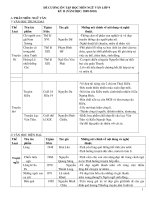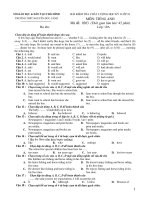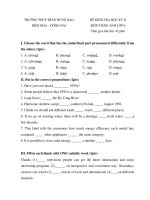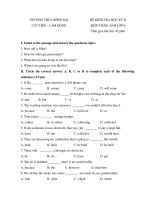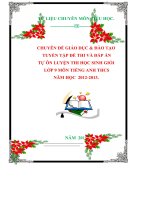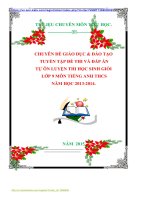Bài tập ôn tập cuối học kỳ II lớp 9 môn tiếng anh
Bạn đang xem bản rút gọn của tài liệu. Xem và tải ngay bản đầy đủ của tài liệu tại đây (78.94 KB, 10 trang )
ĐỀ CƯƠNG ÔN TẬP CUỐI KỲ II
MÔN TIẾNG ANH 9
I/ THEORY:
1/ Vocabulary: All the vocabulary from unit 7 to unit 11.
2/ Grammar: Unit 7 - Unit 11
- Quantifiers
- Conditional sentences types 1,2
- Articles
- Past and past perfect
- Relative clauses
A. PRONUNCIATION
* Circle the word whose underlined part is pronounced differently from the
others.
1. A. walks
B. begins
C. helps
D. cuts
2. A. kites
B. catches
C. oranges
D. buzzes
3. A. replace
B. surface
C. palace
D. purchase
4. A. content
B. celebrate
C. call
D. count
5. A. organized
B. cleaned
C. opened
D. hoped
6. A. walked
B. sentenced
C. missed
D. wondered
* Circle the word whose underlined part is stressed differently from the others.
1. A. spacecraft
B. gemstone
C. infant
D. abroad
2. A. unidentified
B. conclusive
C. decisive
D. mysterious
3. A. despite
B. exist
C. creative
D. precious
4. A. conclusive
B. holiday
C. capture
D. terrify
5. A. identify
B. mysterious
C. disappear
D. imagine
B. LANGUAGE IN USE : Choose the best answer among A, B, C or D .
1. She was __________ because of her bad result.
A. happy
B. happily
C. unhappy
D. unhappily
2. I want to see the __________ of environment from the local authority.
A. protect
B. protected
C. protecting
1
D. protection
3. We _______ Dorothy since last Saturday.
A. don’t see B. haven’t seen
C. didn’t see D. hadn’t seen
4. To make this cake successfully, you should _____ the eggs lightly.
A. marinate
B. whisk
C. dip
D. grate
5. I ______ to New York three times this year.
A. have been B. was
C. were
D. had been
6. The little girl asked what _______ to her friend.
A. has happened
B. happened C. had happened
D. would have been
happened
7. John ______ a book when I saw him.
A. is reading B. read
C. was reading
D. reading
8. He said he _______ return later.
A. will
B. would
C. can
D. would be
9. _____ means frying food in oil that covers it completely.
A. Stir-fry
B. Deep-fry
C. Steam
D. Stew
C. was going
D. goes
10. He _______ to Ha Noi ten days ago.
A. has gone
B. went
11. I don’t think he will ever get_______ the shock of his father's death.
a. over
b. through
c. by
d. off
12. She applied for training as a pilot, but they turned her _______ because of her
poor eyesight.
a. up b. back
c. down
d. over
13. These old houses are going to be _______ soon.
a. laid out
b. run down
c. knocked out
d. pulled down
14. If you want to join this club, you must_______ this application form.
a. make up
b. write down
c. do up
d. fill in
15. The water company will have to _______ off water supplies while repairs to the
pipes are carried out.
a. take
b. cut
c. set
d. break
16. You know I'll always stand_______ you if you are in trouble.
a. for b. up
c. by
d. with
17. In the future, men and women_____ equal roles in society.
A. play
B. will be played
C. will play
18. If you spoke more slowly, he ________ you.
2
D. are playing
A. would understand
B. will understand
C. understands
D. understood
19. If I ________ a chance to go abroad, I ________ Paris.
A. had/ will visit
B. had/ would visit C. have/ will visit
D. had/ visit
20. If you ________ in my position, what would you do?
A. were
B. would be
C. are
D. will be
21. If you eat a lot of fruit, you ________ health problems.
A. had
B. will never have
C. have
D. may have
22. We enjoyed our camping holiday _________ of the terribly heavy rain.
A. in spite
B. despite
C. although
D. because
23. She is very tired; __________ she has to finish her homework.
A. moreover
B. so
C. and
D. however
24. The people __________called yesterday want to buy the house.
A. who
B. which
C. when
D. whom
25. It’s the house __________ door is painted red.
A. what
B. whose
C. who
D. which
26. The author ________ you criticized in your review has written a reply.
A. where
B. which
C. whom
D. when
27. The book ________ I liked was the detective story.
A. who
B. which
C. whom
D. where
28. The United Nations, ________ was established in 1945, has over 200 members.
A. which
B. that
C. what
D. it
29. The picture reminds him of the time ________ he studied in New York.
A. where
B. why
C. which
D. when
30. I am interested in ________ history, especially ________ history of Western of
Europe.
A. the/ the
B. Ø / the
C. Ø / Ø
D. a/ a
31. There isn’t _____ milk in the fridge.
A. a
B. an
C. some
D. any
32. Parking is very difficult in ________ city centre, so my father always goes there
by ________ bus.
A. the – Ø
B. the – the
C. a – a
D. a – Ø
33. She spoke English with a(n) _________ that I couldn't understand.
A. accent B. stress
C. intonation
34. Louis is virtually bilingual_________ Dutch and German.
3
D. tone
A. on
B. in
C. for
D. with
35. She _______ up some Spanish when she was living in Mexico.
A. took B. looked C. picked D. learnt
36. Teachers provide a model for children to _________.
A. allow B. behave C. change D. imitate
37. Peter can just about get ____________ in German.
A. up
B. down
C. out
D. by
38. Sound symbolism means that we often _________ the meaning of a word from
its sound.
A guess B.judge C imagine D. expect
39. I can have a conversation in Italian, but I'm a _______ rusty.
A. bit
B. lot C. very
D. too
40. Is English a(n) ______ language in your country?
A. mother
B. official
C. living
D. old
41. He spoke a ________ of French the we found hard to understand.
A. slang B. jargon
C. dialect
D.
language
42. Do you mind_______ such a long way to work everyday?
a. to travel
b. travel
c. to have traveled d. traveling
43. Please tell me what_______
a. doing
b. do
c. to do
d. to have done
44. Paula has given up _______ to lose weight.
a. try b. trying
c. to try
d. to have tried
45. Gold_____ in California in the nineteenth century.
a. was discovered
b. has been discovered
c. was discover
d. they discovered
46. _____ that military spending is extremely high.
a. We are felt
b. It feels
c. It is felt
d. We feel that it is
47. _____the chicken in white wine for one hour before roasting.
A. slice
B. chop
C. marinate
D. grate
48. He bought a _____ of bread in the supermarket yesterday.
A. bunch
B. clove
C. loaf
D. pinch
49. “Let's go to the movie now." –
“Oh! ________________”
A. I need it
C. Why's that?
B. Good idea!
4
D. I don't.
50. “Why don’t we go to the cinema now?” - “________”
A. Will you join us? B. Yes, let’s!
C. I’d like it.
D. What play is it?
51. “That’s an excellent drawing, Hoa.” - “……………………….”
A. Well done
B. I’m sorry
C. That’s very kind of you to say so.
D. That’s a good idea.
C. There is a mistake in the four underlined parts of each sentence. Find the
mistakes (A, B, C, or D)
1.
Even though Mary is a European, but she enjoys Tet holiday in Viet Nam
A
2.
B
B
C
B
C
D
D
If we will go on littering, the environment will become seriously polluted.
B
C
D
If we pollute the water, we don’t have fresh water to use.
A
8.
C
Did your children enjoy to swim in the sea?
A
7.
D
D
B
A
6.
C
We suggest to put garbage bins around the school-yard.
A
5.
D
She has taught in this school since five years.
A
4.
C
I got up late this morning, that I didn’t have time for breakfast.
A
3.
B
B
C
D
Thank you for looking up the children while I was out.
A
B
C
D
9. Mr. Thach who sing English songs very well is my teacher of English.
A
B
C
D
10. Nam wishes he can speak English fluently.
A
B
C
D
D. READING COMPREHENSION:
I. Choose the word or phrase among A, B, C or D that best fits the blank space
in the following passage:
Earth, our beautiful home planet, is the only astronomical object to accommodate life
(1) ______we know it. Scientists believe Earth was (2) ______ approximately 4.5
5
billion years ago. It is the fifth-largest (3) ______ in our solar system. Its equatorial
diameter is about 12,074 kilometres. Earth is the third-closest planet to the sun. The
distance from Earth to the sun is roughly 149,600,000 kilometres. It (4) ______ 365,3
days for Earth to orbit the sun, and 24 hours to rotate on its axis. The surface
temperature ranges from -88 to 58 0C. Nearly 70 percent of Earth’s surface is
covered by ocean, (5) ______ has an average depth of about 4 kilometres. In 2015 it
was estimated that 7,3 billion humans are living on Earth.
1.
A. as
B. so
C. because
D. that
2.
A. find
B. formed
C. found
D. built
3.
A. system
B. planet
C. star
D. sun
4.
A. has
B. takes
C. gets
5.
A. what
B. that
C. which
D. begins
D. where
II. Choose the word or phrase among A, B, C or D that best fits the blank space
in the following passage:
I started learning English when I was 14 years old after five years of studying
Russian.
In the beginging, I encountered some difficulties learning the language, but I tried
my best to overcome them.
Firstly, my English pronunciation was (1)_______ by the way I spoke Russian.
To solve this problem, I practiced by listening to tapes in English every day. I played
the tape, stopped after each sentence, and (2)_______ the sentence several times.
At school, I joined an English speaking club (3)_______ was organised by a teacher
from Britain. She understood my difficulty and helped me very much in improving my
pronunciation.
Secondly, I found it really hard to learn English vocabulary. In Russian, the
way you write the word is the way you pronounce it. However, English spelling is
often (4)_______ from its pronunciation. To get over this difficulty I started using the
dictionary. Whenever I learnt a new word, I looked it (5) _______ carefully in the
dictionary. Then I tried to remember the way to read and write the word.
After that, I wrote the word down several times in a notebook. Gradually, I got
(6)_______ to the spelling system of the language. Now I’m confident that my
English has become much better.
6
1.A. effected
B.given
C.affected
D.reflected
2.A. said
B.told
C.spoke
D.repeated
3.A. which
B.it
C.and
D.but
4.A. different
B.the same
C.far
D.differ
5.A. down
B.on
C.out
D.up
C.well
D.attracted
6.A .used
B.remembered
III. Read the following passage carefully and choose the correct answer.
Sydney is Australia’s most exciting city. The history of Australia begins here.
In 1788 Captain Arthur Philips arrived in Sydney with 11 ships and 1624 passengers
from Britain (including 770 prisoners). Today there are about 3.6 million people in
Sydney. It is the biggest city in Australia, the busiest port in the South Pacific and
one of the most beautiful cities in the world. In Sydney, the buildings are higher, the
colors are brighter and the nightlife is more exciting. There are over 20 excellent
beaches close to Sydney and its warm climate and cool winter have made it a
favorite city for immigrants from overseas. There are two things that make Sydney
famous: its beautiful harbor, the Sydney Harbor Bridge, which was built in 1932 and
the Sydney Opera House, which was opened in 1973.
1. Where did Captain Arthur Philips arrive in 1788?
A. South Pacific
B. Sydney Harbor
C. Britain
D. Sydney
2. Which of the following should be the title of the reading passage?
A. Sydney’s Opera House
B. The history of Sydney
C. Sydney’s beaches and harbors
D. An introduction of Sydney
3. Which of the following statements is NOT true about Sydney?
A. Sydney is not a favorite city for immigrants from overseas.
B. Sydney is one of the most beautiful cities in the world.
C. Sydney is the most exciting city in Australia.
D. Sydney is the biggest port in the South Pacific.
4. How many beaches are there close to Sydney?
A. 11 beaches
B. over 20 beaches C. nearly 20 beaches
D.
beaches
5. When was the Sydney Harbor Bridge built?
A. 1788
B. 1973
C. 1932
7
D. 1625
770
E. WRITING.
Fill each blank in the conversation with a, an, some, or any.
Nick:
Mi:
Let's discuss what to prepare for our picnic.
You and I have been assigned to buy (1)………. fruit and drinks.
Nick: I think it would be better to buy fruit which are easy to peel, such as bananas
or mandarins.
Mi:
(2) __ kilo of mandarins and (3) __ bunch of bananas are enough, I think.
Nick: Should we buy (4) _ _____snacks such as crisps?
Mi:
That's fine. Let me write it down: (5) _ _____big packet of potato crisps.
Nick: What about drinks?
Should we buy soft drinks?
Mi:
good idea. Just buy (6)……..
I don't think that's a
bottles of mineral water.
Nick: My mother told me she could bake (7) _ __apple pie for us.
Mi:
Oh, that's great!
F. Viết lại câu
* Relative Clause (Mệnh đề quan hệ)
1. Have you ever spoken to the people? They live next door
………………………………………………………………
2. It’s a book. It will interest children of all ages
………………………………………………………………
3. The people keep having all night parties. They live next door
………………………………………………………………
4. These are the keys. They open the front door and back door
………………………………………………………………
5. I don’t know the girl. Miss Lien is talking to her
………………………………………………………………
6. Half of the people didn’t appear. They were invited
………………………………………………………………
7. The festival is called Easter. It is in late March or early April
………………………………………………………………
8. I know the man. You talked to him last night
………………………………………………………………
8
9. I bought some pencils. They are in at that bookstore
………………………………………………………………
10. She ate a peach. The peach was still green
………………………………………………………………
* Conditional sentences type 1, 2 (Câu điều kiện loại 1, loại 2)
1. We can’t buy this car because it is very expensive.
If ……………………………………………………
2. I can’t do this test because it is very difficult.
If ……………………………………………………
3. They don’t take a map, so they will lose their way.
If ……………………………………………………
4. I’m not rich, so I don’t live in a big house.
If ……………………………………………………
* Passive voice (Câu bị động)
1. My father waters this flower every morning.
This flower …………………………………………………………………………………
2. John invited Fiona to his birthday party last night.
Fiona………………………………………………………………………………………
3. Her mother is preparing the dinner in the kitchen.
The dinner………………………………………………………………………………
* Viết câu hỗn hợp
1. I don’t have a new car.
I wish …..………………………………………….………………………………………
2. They will build a new supermarket here tomorrow.
A new supermarket ………………………………………………………………………
3.“I will go to my village tomorrow ” He said.
He said ……..………………….
…………………………………………………………..
4. My brother likes playing soccer every morning.
My brother is interested…………………………………………………………………
5. Despite the bad weather, Nam went out for a picnic.
9
Although……………………………………………………………………………………
6. People say that the professor will arrive this morning
It ……………………………………………………………………………………………
7. I don’t have a new computer.
I wish ……………………………………………………………………………………...
8.“I will go to my village next week” Ms nga said.
Ms nga said………………………………………………………………………………..
9. My father likes playing soccer every morning.
My father is interested……………………………………………………………………
10. Ba doesn’t have a brother.
Ba wishes …………………………………….……………………………………………
11. They grow rice in tropical countries.
Rice …………………………………………………………………………………………
12.“I will go to my village next week” Mr. Nam said.
Mr. Nam said …………………………….……………………………………………….
13. They thought the professor would arrive this morning.
It …………………………………………………………………………………………….
14. I’ve been working for this company for ten years.
I
started
……………………………………………………………………………………..
15. I'm sorry that I didn't finish my homework last night.
I wish ……………………………………………………………………………………….
16. Reading scientific books is one of my interests.
I'm …………………………………………………………………………………………..
17. She hasn't played the piano for five years.
→ The last time ……………………………………………………………………………….
18. The last time I saw him was in June, 2005.
→ I have not …………………………………………………………………………………..
19. We started cooking for the party two hours ago.
→ We have ……………………………………………………………………………………
20. I learned a few words of English on holiday.
I picked ……………………………………………………………………………………
10
